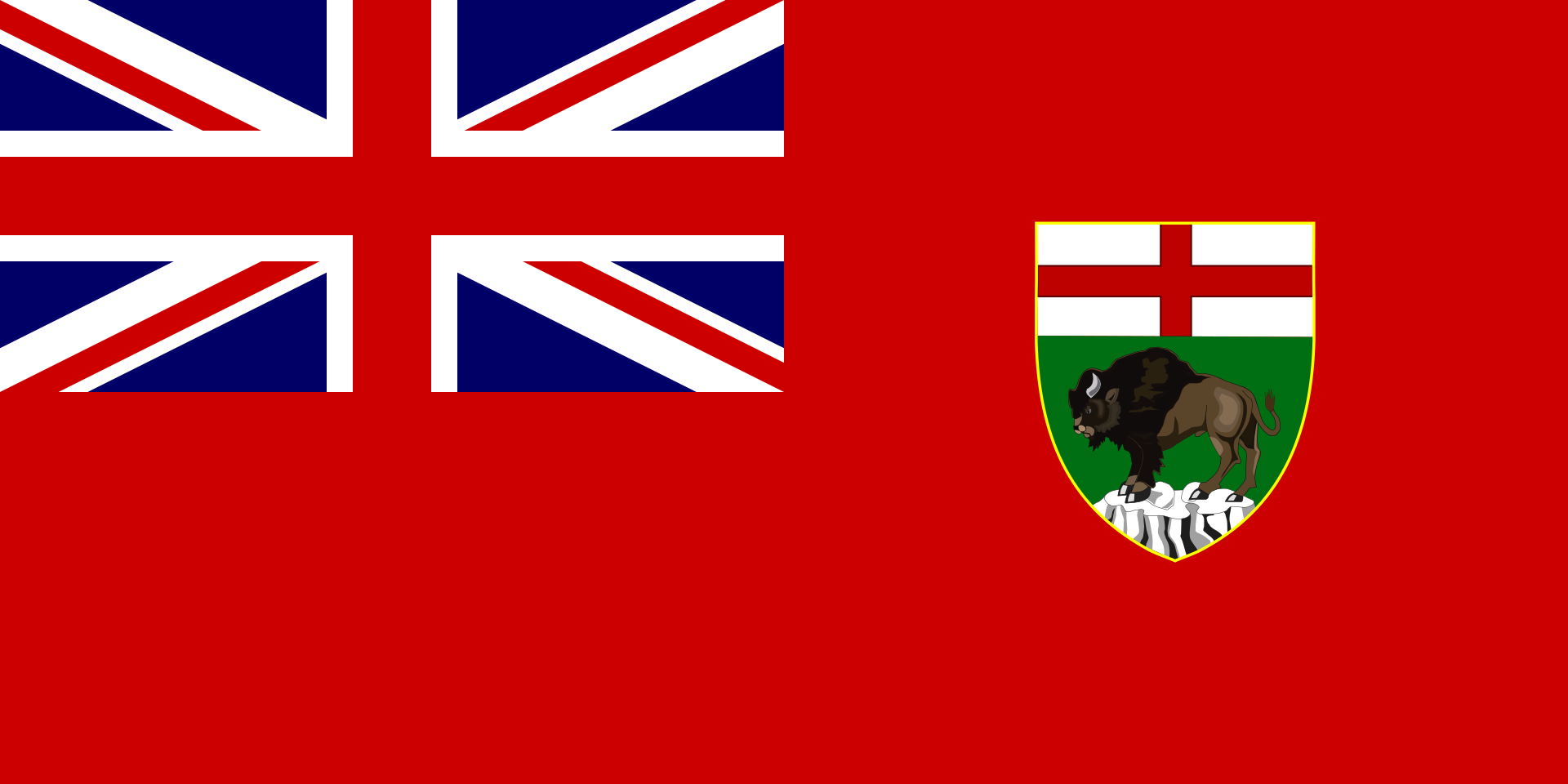
Winnipeg [ˈwɪnɪpɛg] ist die Hauptstadt der kanadischen Provinz Manitoba und zugleich deren mit Abstand größte Stadt. Sie zählte im Jahr 2011 über 660.000 Einwohner, die Metropolregion rund 730.000. Damit ist Winnipeg die siebtgrößte Stadt in Kanada.[1] Der Name leitet sich vom 55 Kilometer nördlich gelegenen Winnipegsee her; „win“ bedeutet in der lokalen Cree-Sprache schlammig und „nipee“ Wasser.
Bekannt als Gateway to the West (Tor zum Westen), ist Winnipeg ein Eisenbahn- und Verkehrsknotenpunkt mit einer diversifizierten Wirtschaft. Die Stadt ist multikulturell und Heimat mehrerer Sportvereine. Winnipeg war 1967 erster kanadischer Gastgeber der Panamerikanischen Spiele. Die Stadt ist bekannt für zahlreiche jährliche Festivals, darunter das Winnipeg Folk Festival.
温尼伯(英语:Winnipeg;![]() i/ˈwɪnɪpɛɡ/),加拿大当地粤语人士称之为温尼辟,座落于草原三省东缘,是加拿大第八大城市,也是马尼托巴省省会和该省最大城市,半数以上的马尼托巴省人口集中于此,现有人口约71万[1]。温尼伯的名字源于当地原住民的克里语,意为“浑水”。温尼伯在地理上属于西加拿大。它是一个运输、经济、制造业、农业与教育的重镇。同时也是西加拿大的重要交通枢纽,距美国边境仅96公里。1738年,法国商人在此建立第一个贸易站,在这之前,温尼伯已成为原住民诸部落的贸易中心。1812年,一批苏格兰移民在此定居。1873年,城市人口增至1869人。
i/ˈwɪnɪpɛɡ/),加拿大当地粤语人士称之为温尼辟,座落于草原三省东缘,是加拿大第八大城市,也是马尼托巴省省会和该省最大城市,半数以上的马尼托巴省人口集中于此,现有人口约71万[1]。温尼伯的名字源于当地原住民的克里语,意为“浑水”。温尼伯在地理上属于西加拿大。它是一个运输、经济、制造业、农业与教育的重镇。同时也是西加拿大的重要交通枢纽,距美国边境仅96公里。1738年,法国商人在此建立第一个贸易站,在这之前,温尼伯已成为原住民诸部落的贸易中心。1812年,一批苏格兰移民在此定居。1873年,城市人口增至1869人。
温尼伯的经济由金融、制造、餐饮、文化及旅游组成。城内有理查德森国际机场。由北美一级铁路构筑的城市铁路东西通往加拿大各省,向南则驶往美国。以温尼伯为主场的体育队有:温尼伯蓝色轰炸机队(加拿大式橄榄球)、温尼伯喷射机队(冰球)及温尼伯黄金眼队(棒球)。坐落在温尼伯的大学及学院有:马尼托巴大学、温尼伯大学、加拿大门诺会大学、圣伯尼菲斯大学及红河学院。
温尼伯拥有不同种群的人口,其中菲律宾人占总人口的比例数在加拿大全国为最高,他加禄语也成为城市中使用比例最高的非英语第二语言。然而,其人口的绝大多数仍由欧洲裔构成(如乌克兰人、俄罗斯人、德国人)。其中十分之一以法语为母语。温尼伯亚裔在市中心也建立了唐人街。
ウィニペグ[2](英語: Winnipeg)は、カナダのマニトバ州南部にある都市。同州最大の都市かつ州都であり、同州の人口の半分以上が当市に集まっている。カナダの小麦生産地帯の中核都市であり、農産物の流通の中心でもある。ウィニペグに住む人たちは通称「Winnipegger(ウィニペガー)」と呼ばれている。
Winnipeg (/ˈwɪnɪpɛɡ/ (![]() listen)) is the capital and largest city of the province of Manitoba in Canada. Centred on the confluence of the Red and Assiniboine rivers, it is near the longitudinal centre of North America, approximately 110 kilometres (70 mi) north of the Canada–United States border.
listen)) is the capital and largest city of the province of Manitoba in Canada. Centred on the confluence of the Red and Assiniboine rivers, it is near the longitudinal centre of North America, approximately 110 kilometres (70 mi) north of the Canada–United States border.
The city is named after the nearby Lake Winnipeg; the name comes from the Western Cree words for muddy water. The region was a trading centre for aboriginal peoples long before the arrival of Europeans. French traders built the first fort on the site in 1738. A settlement was later founded by the Selkirk settlers of the Red River Colony in 1812, the nucleus of which was incorporated as the City of Winnipeg in 1873. As of 2011, Winnipeg is the seventh most populated municipality in Canada.[13] Being far inland, the local climate is extremely seasonal even by Canadian standards with average January lows of around −21 °C (−6 °F) and average July highs of 26 °C (79 °F).[7]
Known as the "Gateway to the West", Winnipeg is a railway and transportation hub with a diversified economy. This multicultural city hosts numerous annual festivals, including the Festival du Voyageur, the Winnipeg Folk Festival, the Jazz Winnipeg Festival, the Winnipeg Fringe Theatre Festival, and Folklorama. Winnipeg was the first Canadian host of the Pan American Games. It is home to several professional sports franchises, including the Winnipeg Blue Bombers (Canadian football), the Winnipeg Jets (ice hockey), Manitoba Moose (ice hockey), Valour FC (soccer), and the Winnipeg Goldeyes (baseball).
Winnipeg est la capitale de la province du Manitoba, la septième ville par la population au Canada.
La cité est située à la confluence des rivières Rouge et Assiniboine, protégée des crues par le canal de dérivation de la rivière Rouge. C'est l'un des plus grands marchés aux grains du monde.
À 95 % anglophone, Winnipeg abrite cependant une communauté francophone, essentiellement regroupée dans le quartier de Saint-Boniface, dont elle représente environ 30 % de la population1.
Winnipeg (IPA: [ˈwɪnɪpɛɡ]; ) è la capitale e la città più popolosa della provincia canadese del Manitoba, possedendo oltre la metà della popolazione del territorio. Situata sul margine orientale della regione delle Praterie canadesi, Winnipeg svolge un ruolo importante nel campo dei trasporti, della finanza, dell'industria, dell'agricoltura e dell'istruzione; è inoltre un nodo fondamentale del traffico autostradale e ferroviario fra est e ovest del Canada, e per questo è definita la «porta dell'ovest»[2][3].
Winnipeg ![]() [ˈwɪnɪpɛɡ] (?·i) es la capital y la ciudad más poblada de la provincia canadiense de Manitoba, localizada en las praderas del Oeste de Canadá.12 Es, además, la séptima ciudad más grande de Canadá, la más importante del centro del país y la ciudad principal de su área metropolitana, la Región de Winnipeg Capital.
[ˈwɪnɪpɛɡ] (?·i) es la capital y la ciudad más poblada de la provincia canadiense de Manitoba, localizada en las praderas del Oeste de Canadá.12 Es, además, la séptima ciudad más grande de Canadá, la más importante del centro del país y la ciudad principal de su área metropolitana, la Región de Winnipeg Capital.
Alrededor de la mitad de la población total de Manitoba reside en la Región de Winnipeg Capital, cuya población es de 730 305 habitantes. La ciudad de Winnipeg cuenta con una población total de 663 617 habitantes (Censo de 2011).3 La ciudad se encuentra en la confluencia de los ríos Rojo y Assiniboine. Caracterizada por un clima riguroso (temperatura media de -19 °C en enero, pero de 19,7 °C en julio) es considerada como una de las grandes ciudades más frías del mundo.
Winnipeg posee edificaciones históricas y numerosos parques, como el Assiniboine Park o el Birds Hill Provincial Park. Por su situación, está también muy próxima a los ríos del Escudo Canadiense y numerosos lagos, entre los que se encuentran el lago de los Bosques, el lago Winnipeg (el decimosegundo más grande del mundo) y el lago Manitoba.4
Ви́ннипег (англ. Winnipeg) — город в Канаде, главный город провинции Манитоба, при впадении реки Ассинибойн в реку Ред-Ривер; коммерческий и транспортный центр Канадского Среднего Запада.




 Manitoba-MB
Manitoba-MB




